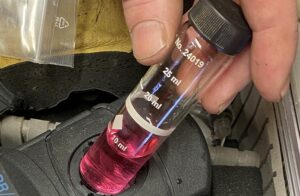Nipissing the initial First Nation on Turtle Island to test wastewater for COVID-19

By Kelly Anne Smith
NIPISSING FIRST NATION— Being the initial First Nation in Turtle Island to have wastewater tested for SARS-CoV-2 that causes coronavirus disease 2019 (COVID-19), Nipissing First Nation has found the virus in a sample.
The shed virus was detected in the samples collected at the Garden Village Wastewater Treatment Plant on Jan. 18.
Chief Scott McLeod says Nipissing First Nation has the right type of wastewater system for the testing, which is another “tool” in the toolbox in the fight against the COVID-19 pandemic.
“Because our community is spread out throughout different, smaller communities, there is a lot of geographic distance between these communities— we are not all on the same system. The one in Garden Village services the larger population of our on-reserve community.”
Nipissing First Nation recently confirmed a person with COVID-19 at a business on-reserve. Chief McLeod credits the initiation of curbside service to help manage the spread.
“Exposure was limited, and through contact tracing protocol, that case has been resolved.”
Research co-led by Robert Delatolla at the University of Ottawa has the virus being detected in wastewater, thus alerting municipalities. Tricia Hamilton, Senior Engineer of Ontario First Nations Technical Services Corporation, will work with Nipissing First Nation during the free wastewater testing.
Chief McLeod says the wastewater testing could pick up variants.
“The concern is that once the virus starts to mutate, you want to be able to detect all the variants.”
Nipissing First Nation Director of Community Infrastructure Patrick Stevens was informed by the University of Ottawa that if someone is infected with COVID-19, it shows up in their fecal matter prior to any other method of testing.
“If someone is asymptomatic, we can identify that someone has COVID-19 even though nobody is showing symptoms.”
While the water treatment plant is the right system for testing, it must be approached with caution.
Stevens explains sewage is collected and pumped into the waste treatment plant into two huge cells in the extended aeration system.
“The bottom of the tank is airlined. We pump a lot of air through it. The air separates the waste from the water.”
With the virus that causes COVID-19 being airborne, Stevens says it’s possible that the shed virus can become aerosol thus airborne in the plant.
“We have two waste treatment operators. Nobody else can go into the plant. They go right to the plant and straight home after,” he explains. “We have extensive protocol to follow for being inside that building, plus total full PPE (personal protective equipment) that they have to wear in a limited amount of time in that building.”
Stevens says Nipissing First Nation has been careful right from the start and has shared information.
“I was able to contact the Ontario Municipal Association when we first discovered this, and I relayed this to the rest of the First Nations that may have a system like ours or any conditions First Nations might have to work with. Even if you go down into the manholes, you could come into contact with [the virus that causes] COVID-19.”
Weekly testing takes place in Garden Village and Duchesnay. Samples are then transported to a laboratory to test for viral RNA levels. Results are reported as soon as possible to the Nipissing First Nation Health Services Department.


